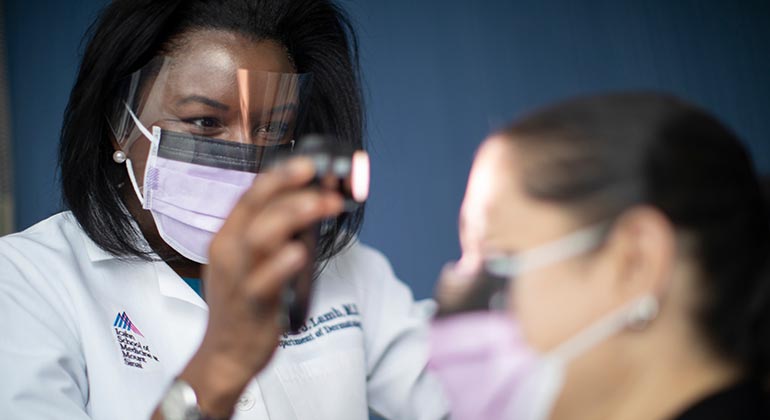General Dermatology

Whatever your skin concerns, Mount Sinai Dermatology can help. We diagnose and treat a wide variety of skin conditions, including chronic disorders like psoriasis and eczema. We offer the latest medications and technologies for treatment, including advanced biologic medications and light therapy to treat more severe cases of psoriasis and eczema. In addition to treating active skin conditions, we can recommend approaches for skin maintenance care that will help keep your skin healthy even when those active conditions are treated. It is important to realize that changes in your skin can sometimes signal other health concerns.
We can help with conditions that affect the hair and nails as well. We diagnose and treat hair loss, head lice, nail fungus, and many other conditions. We are always sensitive to emotional issues involved with skin problems, and we individualize our treatment to meet your specific needs.
Other Skin Conditions
Mount Sinai has expertise in diagnosing and treating a wide variety of skin conditions. In addition to the most common conditions—acne, rosacea, psoriasis, and skin cancer—we also treat a wide variety of others.
- Bullous diseases cause fluid-filled blisters. We treat a broad spectrum of these diseases, such as pemphigus vulgaris, bullous pemphigoid, and dermatitis herpetiformis. We offer the latest in biologic therapy, including Rituxan® (rituximab) and intravenous immune globulins (IVIg), as well as a wide range of other options, such as mycophenolate mofetil, azathioprine, methotrexate, prednisone, and dapsone.
- Hyperhidrosis is excessive sweating, especially in the armpits. Hyperhidrosis can occur not only in the armpits, but also on hands and/or feet, and even all over your body. It can make you feel uncomfortable, embarrassed, and self-conscious. We can treat both generalized and localized hyperhidrosis. We offer a variety of treatments, including topical or oral medications, BOTOX® injections, a new medical device called miraDry®, and surgical procedures.
- Sexually transmitted diseases are often not considered primarily dermatological, but can affect the skin. The human papillomavirus (HPV) is associated with genital warts and is easily transmitted. Molluscum, another viral infection often spread through sexual contact, is also highly contagious and causes changes to the skin. Molluscum is also very common among children; children spread this condition by normal day-to-day contact, not sexual contact. We treat both HPV and Molluscum with excision and topical treatments.